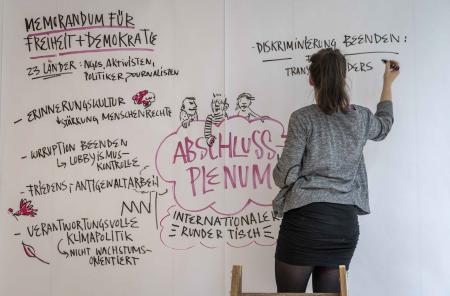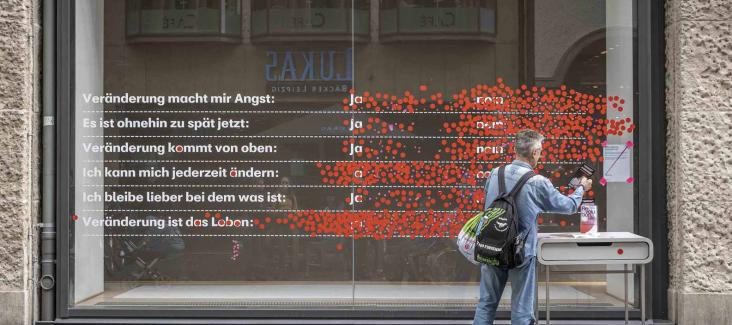On 9 October 1989, over 70.000 people took to the streets in Leipzig despite well-founded fears of violent repression and arrests. They proved simply too many for the regime’s security forces. In stark contrast to previous protests, the demonstration was allowed to carry on without a single arrest being made or a single instance of violence taking place. Their message, that the people are the basis of political power, emboldened movements across Eastern Europe. The events in the fall of 1989 in Eastern Germany were an unexpected tipping point that eventually set in motion the collapse of one of the great poles of power of our world, the Soviet Union.
What shifted the balance in the end were not the nuclear war heads set up all over Europe, but the citizens themselves - normal people like you and me – who had one simple message: the time for a peaceful transition has come. They were families who had landed on opposite sides of the iron curtain, students who had been denied an education simply because they had asked the wrong questions and artists who had found themselves blacklisted for choosing the wrong topics. Fed-up of being lied to and spied on, the citizens of the German Democratic Republic (GDR) demanded nothing less than real democracy.
The Stiftung Friedliche Revolution, an organisation that was founded by some of the activists who helped organise the demonstrations in ‘89, commemorates this event with a yearly International Round Table aiming to carry the message of the Peaceful Revolution out into the world. This year’s edition was attended by civil society representatives from 23 countries. It dealt with topics as broad as climate justice, press freedom and the instrumentalization of new technologies by autocrats.

And so, much more than looking back, the International Round Table dedicates its efforts to looking forward. What are the problems we face around the globe today? How can we carry the lessons of the peaceful revolution into our lives today? The Round Table aims to build bridges between organisations from across the spectrum and each year participants draft a common declaration: a Memorandum for Freedom and Democracy. Parallels are drawn between the Peaceful Revolution and the Fridays for Future movement, but reference is also made to shrinking civic space in Eastern Europe and Turkey and all-out attacks on the institutions of democracy, such as free press and fair elections, around the world.
The festival was accompanied by art performances concentrated in the Karstadt-building, a former department store which saw its windows transformed in a public and interactive exhibition-space. Passers-by could take in art installations on topics such as the war in Syria, watch live performances or even vote on questions such as “What does change mean?” In solidarity with pro-democracy protests in Hong Kong, the Chinese signs for "Democracy" are put up in one of the windows, which is soon decorated with messages of support from the public. Every discussion at the International Round Table is made public by artists rendering a graphic representation of the topics that are addressed. In the evenings, there are public lectures, musical performances and interactive discussion rounds.
On the 9th of October, the festival closes with the traditional Peace Prayer in the Nikolaikirche, the church where the Monday protests first started and from where protesters left exactly 30 years earlier. From there thousands of citizens file onto the Augustusplatz for the Festival of Lights. The last day is tragically overshadowed by an antisemitic terrorist attack in the nearby town of Halle and so the city center is marked by heavy police presence and the Festival of Lights is started with a minute of silence. Afterwards, people form the words "Leipzig '89" with candles as a symbol of hope and non-violent resistance. A message that is on point, even after 30 years.
Pictures courtesy of the Revolutionale.


